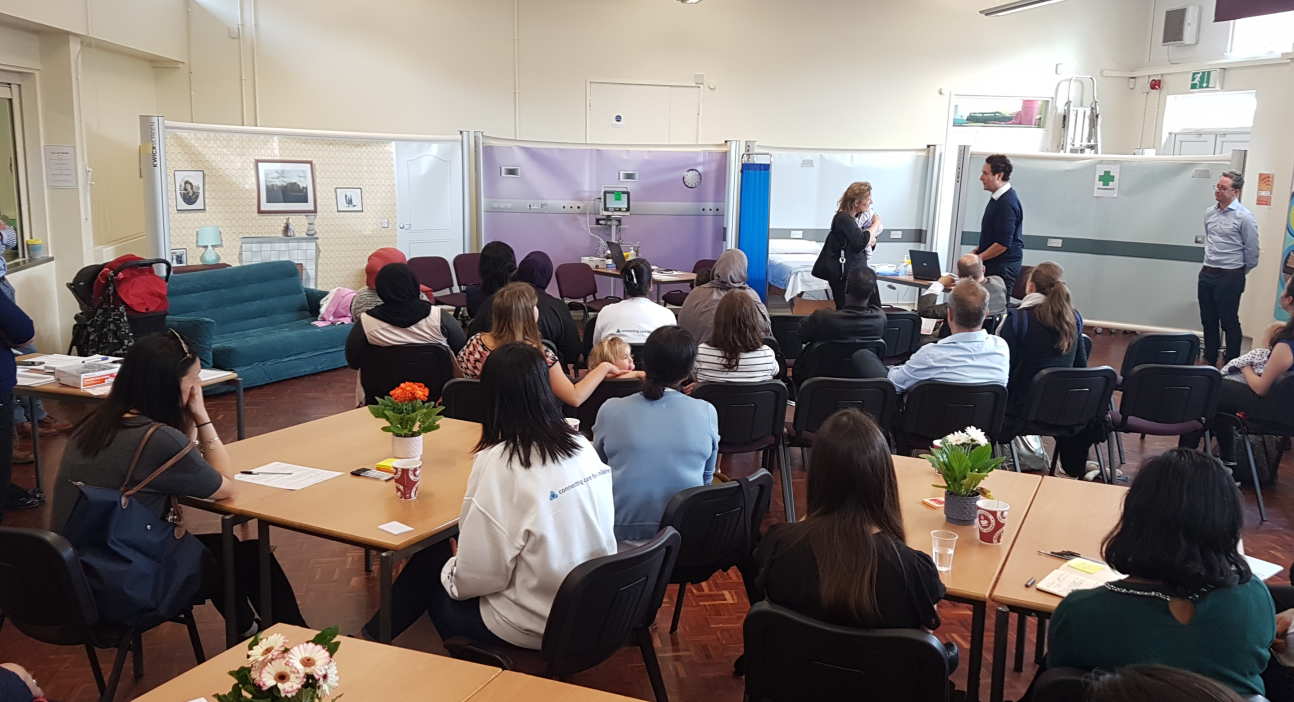Parents gain insights into child healthcare services from simulation
by Maxine Myers

A group of parents from the White City area saw first hand the impact of using and accessing child healthcare services at an Imperial event.
Clinicians from Imperial College Healthcare NHS Trust and researchers from Imperial College London staged a life-like simulation of the journey a mother, played by an actor, makes through the healthcare system when her child becomes ill. The simulation involved re-enacting key points in a patient’s journey such as seeking advice from NHS 111, getting a doctor’s appointment and what treatment to administer. The simulation recreated the anxiety some parents face and the confusion over when to take their child to hospital.
The simulation was the main highlight of the ‘How do you help your unwell child- simulation event’ which recently took place at the White City Community Centre.
 More than 30 parents, GPs and clinicians attended the event. The aim of the event was to get feedback from families and clinicians who deliver child health services in the area on their experience and improvements that can be made. The event was organised by Connecting Care for Children (CC4C), part of Imperial College Healthcare NHS Trust, and the Imperial College entre for Engagement and Simulation Science (ICCESS).
More than 30 parents, GPs and clinicians attended the event. The aim of the event was to get feedback from families and clinicians who deliver child health services in the area on their experience and improvements that can be made. The event was organised by Connecting Care for Children (CC4C), part of Imperial College Healthcare NHS Trust, and the Imperial College entre for Engagement and Simulation Science (ICCESS).
Duncan Boak, Manager of ICCESS, said: “Our event has shown that medical simulation can be an effective method to address a range of healthcare issues and start an open dialogue between patients and healthcare staff. Our simulation of a mother’s journey accessing and using child healthcare services helped highlight some of the issues faced by parents and areas we can improve. We are pleased that we had so many people from the community attend our event and found our simulation informative and useful.”
A recent report claimed that many problems around the quality of care for young people and children in the NHS remain unaddressed, such as: increasing use of hospitals to treat conditions that could be dealt with in other settings; capacity issues in primary care; and the often disjointed care provided between hospitals and the community.
Using simulation methods to mimic a patient’s journey through the NHS system could lead to better understanding of health systems and give patients and those involved in their care an opportunity to voice their concerns or opinions. It could also open a dialogue between patients and healthcare staff outside of the healthcare settings.
At the event, guests were put into groups to discuss the simulation and whether it was an effective method of engaging people in discussions around healthcare. Guests were also asked whether their own experience of using child health services in the area was accurately reflected in the simulation. Some of the feedback included that the simulation felt realistic and helped parents understand more clearly what steps they need to take when their child is unwell. Participants suggested that the simulation should be embedded in NHS antenatal classes so that first-time parents know of the different healthcare support before their children get unwell.
They also shared that the simulation helped highlights area of improvements. For example, tech companies such as Apple and Google should work closely with clinicians and parents to streamline the different care routes available for ill children.
Parents also had the opportunity to design their own ideal healthcare system and talk to doctors from St Mary’s and Hammersmith Hospitals, part of ICHT, about any child health concerns or questions they have. They will also be able to register for free baby resuscitation classes.
The event is an example of the work carried out by ICCESS’ St Mary’s Patient Experience Hub, which is focused on using medical simulation to improve the experience of patients and families at St Mary’s Hospital. The project is funded by Imperial Health Charity.
Article text (excluding photos or graphics) © Imperial College London.
Photos and graphics subject to third party copyright used with permission or © Imperial College London.
Reporter
Maxine Myers
Communications Division